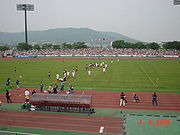
2006 IRB Pacific 5 Nations
Encyclopedia


IRB Pacific 5 Nations
The Pacific Nations Cup is an international rugby union competition originally known as the IRB Pacific 5 Nations and held between five Pacific Rim sides; Fiji, Japan, Samoa, Tonga and Junior All Blacks, . Previously, New Zealand was once represented by the New Zealand Māori...
rugby union
Rugby union
Rugby union, often simply referred to as rugby, is a full contact team sport which originated in England in the early 19th century. One of the two codes of rugby football, it is based on running with the ball in hand...
competition held between five Pacific Rim
Pacific Rim
The Pacific Rim refers to places around the edge of the Pacific Ocean. The term "Pacific Basin" includes the Pacific Rim and islands in the Pacific Ocean...
sides; Fiji
Fiji national rugby union team
The Fiji national rugby union team is a member of the Pacific Islands Rugby Alliance formerly along with Samoa and Tonga. In 2009, Samoa announced their departure from the Pacific Islands Rugby Alliance, leaving just Fiji and Tonga. Fiji are ranked sixteenth in the world by the IRB as of 26...
, Japan
Japan national rugby union team
The Japan national rugby union team represent Japan in international rugby union competitions. Japan is traditionally the strongest rugby union power in Asia but has both enjoyed and endured mixed results against non-Asian teams over the years...
, Samoa
Samoa national rugby union team
The Manu Samoa is the men's representative side of the Samoa Rugby Union in both the 15's and the 7's for international competitions. The Samoa Rugby Union is owned by the affiliated rugby unions of Samoa. In Samoa, Manu Samoa is in honour of a famous Samoan warrior. From 1924 to 1997 Samoa was...
, Tonga
Tonga national rugby union team
The Tonga national rugby union team is nicknamed Ikale Tahi . Like their Polynesian neighbours, the Tongans start their matches with a war dance – the Kailao . They are members of the Pacific Islands Rugby Alliance along with Fiji and Samoa...
and the Junior All Blacks
Junior All Blacks
The Junior All Blacks are a New Zealand rugby union team. The Junior All Blacks are not an age grade side, but the second national team behind the New Zealand national rugby union team....
(New Zealand's second XV). The inaugural tournament kicked off on 3 June 2006 with the Junior All Blacks proclaimed the winner after their 38–8 defeat of Japan on 24 June 2006.
Australia was invited to take part but decided against sending a team as they wanted focus on their domestic competition. However, Australia hosted two games, and Australian Rugby Union
Australian Rugby Union
The Australian Rugby Union is the governing body of rugby union in Australia. It was founded in 1949 and is a member of the International Rugby Board the sport's governing body. It consists of eight member unions, representing each state and territory...
CEO Gary Flowers stated that Australia was keen to participate in the tournament from 2007 onwards. On 18 October 2006 it was announced that they would send their second XV. For this reason, the inaugural tournament was the only one to be known as the "Pacific 5 Nations", and from 2007 the competition was known as the Pacific Nations Cup.
Point system
The tournament is a round-robin of ten games, where each team plays one match against each of the other teams. There are four points for a win, two points for a draw and none for a defeat. There are also bonus points offered with one bonus point for scoring four or more tries in a match and one bonus point for losing by 7 points or less.Standings
| Pos | Country | Pld | W | D | L | F | A | +/− | BP | Pts |
|---|---|---|---|---|---|---|---|---|---|---|
| 1 | 4 | 4 | 0 | 0 | 167 | 47 | 4 | 20 | ||
| 2 | 4 | 2 | 0 | 2 | 121 | 88 | 3 | 11 | ||
| 3 | 4 | 2 | 0 | 2 | 92 | 94 | −2 | 2 | 10 | |
| 4 | 4 | 2 | 0 | 2 | 91 | 113 | −22 | 1 | 9 | |
| 5 | 4 | 0 | 0 | 4 | 48 | 177 | −139 | 0 | 0 |
Round 1
----Round 2
----Round 3
----Round 4
----Round 5
----External links
- Junior All Blacks and Tonga continue winning ways, IRB official website, 10 June 2006

